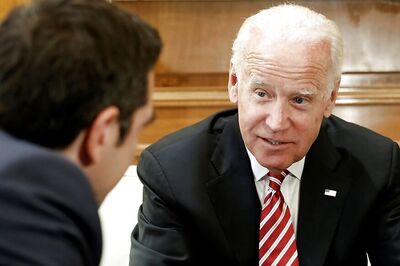
views
The emerging cult of Sidhu Moose Wala, centred around the Moosa village in Punjab where he lived, renders homage to an iconic rap artiste cut down in his prime. But like his music, it is tangled in disturbing narratives of protest, alienation and ethno-nationalism.
While Moose Wala’s death seems to have been the outcome of gang-related activity, with Canada-based gangster Goldy Brar and his associate Lawrence Bishnoi named as the chief conspirators, he has become something of a martyr and his home, a shrine.
Months after he was gunned down while driving to a neighbouring town, visitors from across the globe congregate at his village, purchasing Moose Wala memorabilia and queuing up to meet his father. What makes this different from say, visiting Graceland to pay your respects to Elvis Presley?
The distinction lies in Moose Wala’s less-than-benign legacy. The rapper famously legitimised the image of the gun-toting, anti-establishment, brash young man. He appealed to a generation of Punjabi youth who saw themselves as underdogs and his music, with its underlying themes of defiance and violence, as a language of empowerment.
Moose Wala and his ilk attracted strictures from the courts, which directed the Punjab police to crack down on the glorification of guns and violence. In February 2020, Moose Wala was booked for purveying an obscene song (under IPC section 294).
He was also hauled up under the Arms Act for firing an AK-47 during the Covid-19 lockdown. Unfazed, he released a track comparing his own case with that of actor Sanjay Dutt, who had been jailed for being in possession of an unlicensed weapon.
Prior to making his debut on the music scene in India, Moose Wala lived in Canada, known for transnational Punjabi-Canadian organized crime syndicates that had close ties back home in India. While there’s no evidence of Moose Wala’s involvement with gangs, he is believed to have been a target of threats from members of the underworld in Punjab and Haryana.
More to the point, his ‘gangsta rap’ contributed to the normalisation of the gun culture, in that it projected gun-wielding as rebellion, even heroism, rather than a criminal act.
Moose Wala’s emphasis on cultural identity bordered on sub-nationalism. On the one hand, he was celebrated for displaying pride in his roots; on the other, he drew criticism for playing on a sense of alienation from the mainstream. In his song Panjab, he uses the imagery of militancy and Khalistan, including a visual of Jarnail Singh Bhindranwale and warns ‘Delhi’ that it might face retribution.
In another, ‘SYL’, a reference to the Sutlej Yamuna Link canal and water-sharing arrangements with other states, his tone is almost threatening. He calls for a return of Punjab’s sovereignty and territory and the release of Sikh prisoners from jail, lest insurgents rise again.
Historically, Punjab has always had an uneasy relationship with Delhi. A presumptive sentiment of victimhood, fuelled by political shenanigans, has made it vulnerable to religious revivalism in the past. A cult around a charismatic figure who furthered a narrative of muscular self-assertion could well reinforce a feeling of ‘othering’ among vulnerable Sikh youth. Particularly in the current scenario, where the convergence of multiple crises – economic, social and agrarian – has created an atmosphere of discontent.
Moose Wala tried his hand at politics; after all, there was a strong political element to some of his songs. The Congress nominated him as its candidate from Mansa in the assembly elections of 2022, perhaps in recognition of his support to the year-long farmers’ agitation against the Farm Laws of 2020. He lost to the Aam Aadmi Party, which subsequently withdrew his security detail, shortly before he was shot dead.
The deification of Moose Wala began with a social media furore over his last track, The Last Ride, a tribute to his idol, hip hop artiste 2Pac (Tupac) Shakur, who was killed in 1996. Like Shakur, he was riddled with bullets while riding a shotgun in his car. And like Shakur, he had recorded a track that talked about death just before he was killed.
There’s no doubt he was a talented artiste, a street poet with a talent for revealing the rawness of life at the grassroots. To that extent, Moose Wala deserves to be remembered and honoured. But he cannot serve as a role model for aspirational youth looking to better their lives.
Bhavdeep Kang is a freelance writer and author of ‘Gurus: Stories of India’s Leading Babas’ and ‘Just Transferred: The Untold Story of Ashok Khemka’. A journalist since 1986, she has written extensively on national politics. Views expressed are personal.
Read all the Latest Opinions here


















Comments
0 comment